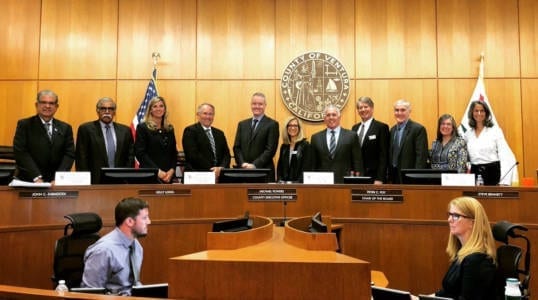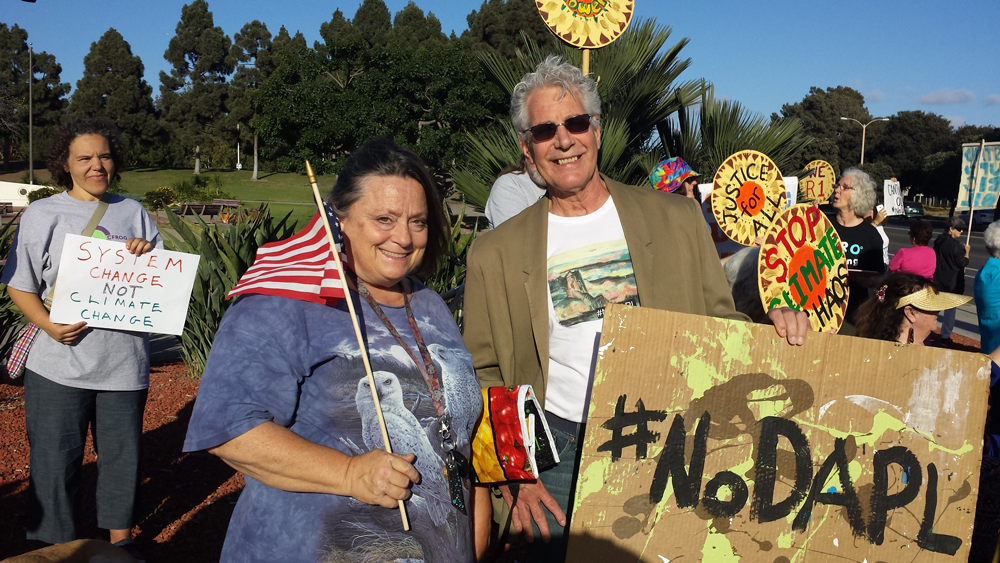Below are the recommendations submitted on October 31, 2018 for the Supervisors and Commissioners Joint Work Session Tuesday, November 6, 1:30-4:30, Supervisors’ Chamber, Admin Building, Ventura County Government Center, 800 Victoria Ave, Ventura 93003. YOU can send YOUR priorities this week to help the Board give direction on writing climate action policies. You can give a 3 minute public comment at the joint work session.
TO: Ventura County Board of Supervisors <[email protected]>
Ventura County Planning Commissioners <[email protected]>
CC Planner Susan Curtis <[email protected]>
350 VENTURA COUNTY CLIMATE HUB
FOR POLICY ALTERNATIVES FOR GENERAL PLAN CLIMATE CHAPTER
- Immediately Create a Citizens’ Advisory Committee to Hold Workshops to Create an Interim Climate Emergency Mobilization Plan: Identify obvious interim goals being adopted by model cities and counties across the country that we can work on together before adoption of the General Plan.
- Reduce GHG Emissions as Much and as Fast as Possible, i.e. CO2 emissions via electrification of buildings and transportation, as well as short-lived climate pollutants, hydroflourocarbons and methane from all sources, which includes the banning of new oil drilling and a tax on methane emissions commensurate with the social cost of ∼$2400 per ton and ∼$3600 per ton).
- Provide Transit-Oriented Very Low-Income Housing, RV Parks and Long-Term Campgrounds and Net Zero Building Codes including experimental permits for functional rather than prescriptive codes aiming for 100% reduction in GHG emissions by or before 2030.
- Reduce Vehicle Miles Traveled with robust Transportation Demand Management that includes improved public transit, walking and biking, full-cost pricing on the use of the automobile including parking policies that reduce available spaces, as well as higher density, mixed-use, and transit-oriented development that reduces the need for driving.
- Expand Effective Community Engagement toward reducing the most potent GHG reduction goals informed by the research by Project Drawdown that prioritizes a ban on SLCP refrigerant gases and tight regulation of the capture of legacy refrigerants, reduction of food waste, increase in plant based diets, education of girls and access to family planning to prevent unwanted pregnancies, land and marine reforestation, regenerative agriculture by building biological soils, and replacement of all lighting with LEDs.
- Create a Microgrid Masterplan to guide installation renewable backup power systems for areas of refuge and emergency facilities and ultimately 100% reduction of GHG emissions toward a carbon negative community by or before 2030 based on Distributed Energy Resources maximizing battery storage and onshore and offshore wind not at utility scale to balance rooftop and parking lot solar generation.
- Create an Ecosystem Restoration Masterplan to prioritize public, private and volunteer investments on degraded lands with nurseries and stormwater capture for aquifer recharge and revegetation, reducing heat islands and creating conditions for normal rainfall.
- Assure Participatory Collaboration and Justice in the planning and implementation of the Interim Plan with concerned residents, youth, faith, labor, business, environmental, economic, racial and social justice organizations and officials in the county and its cities.
Background Justification for Interim Climate Mobilization Plan:
New IPCC report calls for a dramatic reduction in all greenhouse gas emissions to prevent sea level rise and further warming and ocean acidification that will come from earth system feedbacks. In Ventura County swift action may reduce the severity of drought, salt water intrusion, and extreme weather events that increase flooding, heat waves and evaporation on land.
The whole community needs a plan now. We need to be able to work together on the many opportunities that nobody can do alone and we can’t wait more years without having one a plan to bring us together. Science describes an existential climate emergency threatening our city, region, state, nation, civilization, humanity and the natural world. We see a disconnect between the urgency of the problem and the pace of the development of solutions. As we work through the process of General Plan Update in order to have a fully researched and reviewed carbon emissions and flux inventory, goals, targets and programs, we must face that global society only has twelve more years to make changes in emissions and reforestation and carbon capture technology at a scale of change unprecedented in human history Ventura County has the material and moral capacity to respond commensurate with what is required of the rest of the humanity..
Leadership and public outreach. A successful plan starts with being forthright in gathering and communicating needed facts so people can rise to the challenge of this great crisis with active consultation, participation, and in ways that assure benefits for workers and disadvantaged communities. A good basic plan will easily create hundreds of good paying jobs in building and installing local energy generation, redesigning our transportation system and restoring and regenerating our ecosystems.
Transportation contributes over half of our carbon emissions. Therefore it is urgent to help people stop driving gas-fueled vehicles. A robust Transportation Demand Management program is required now with parking policies that reduce available parking spaces and increase parking fees to help fund improved bus routes and passes.
Methane emissions contribute to global warming, damage public health and reduce the yield of ecosystems. In Shindell, et al, 2017, when the physical, economic, climate and air quality consequences are calculated, the social cost of methane is ∼$2400 per ton and ∼$3600 per ton with 5% and 3% discount rates respectively. These values are ∼100 and 50 times greater than corresponding social costs for carbon dioxide. Existing technology and policy options can provide social benefits that outweigh implementation costs. Renewables compare far better against use of natural gas in electricity generation when incorporating social costs for methane. Changes in livestock management practices, promoting healthy diets including reduced beef and dairy consumption, and reductions in food waste have the potential to provide large societal benefits (∼$50-150 billion per year)
What Can I Do? Update the County’s Suggested Personal Climate Actions List
The Ventura County Air Pollution Control District produced a 38 page Climate Change Almanac in 2010 with four pages of suggested individual actions. An up-to-date publication is urgently needed that has a condensed list of actions almost everyone can do. It should be simple to reproduce and share online and just present solutions. Here are some suggestions from various Climate Action Plans around the country for an Interim Climate Mobilization Plan (while we’re waiting for the VC2040 Climate Action Plan):
- decrease use of fossil fuels by 1% in 2019 and 2% in 2020
- increase miles traveled by public transit 1% in 2019 and 2% in 2020
- start a Green Ventura County fund to finance sustainability initiatives
- incorporate complete street principles in all new roadway & rehab projects
- pursue car sharing and employer sponsorship of bus passes
- encourage onsite stormwater retention and infiltration and discourage runoff by restructuring sewer and/or stormwater fee
- reduce energy consumption 2% per year with mandatory benchmarking ordinance
- increase within-county renewable energy generation by 5% by 2020
- create a community microgrid masterplan
- plan for a park or outdoor recreation area within a 15 minute walk of anyone
- implement renewable backup power systems for areas of refuge and emergency facilities
- use Drawdownas a guide, like Marin County is doing, for the science on which solutions have the biggest impact
- plant 10,000 trees or increase percent area of tree cover by 3% by end of 1019
- increase number of people eating plant-based diets
- encourage development of food hubs, and increase the processing and distribution of locally, regeneratively produced foods.
- decrease food waste by 3% per year
- increase by 3% per year the number of people who can name three things they are doing as part of the Interim Climate Mobilization Plan
- encourage neighborhoods and localities of NextDoor.com localities to choose several goals that the people decide they can support each other to do or do together and measure increase in number of people who can name a certain number of their goals


